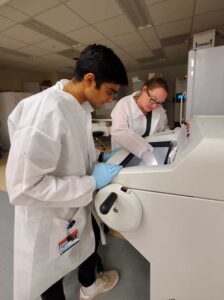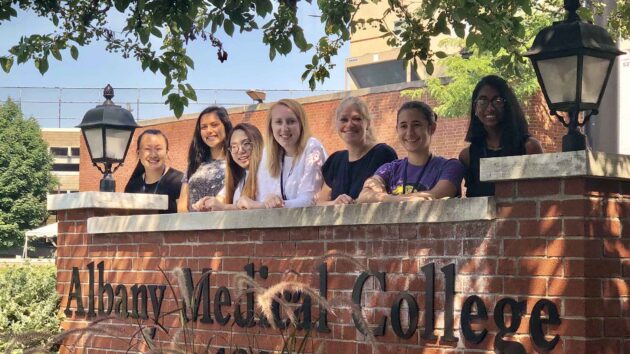A Free Summer Program

The NextGen Neuroscience Summer Program is a free, six-week integrated live and virtual program hosted by the Department of Neuroscience and Experimental Therapeutics for undergraduate and high school students (16 yrs+) interested in neuroscience.
The program focuses on an introduction to neuroscience research, scientific communication skills, and educational guidance. Students have an opportunity to speak to professionals in the field of neuroscience, including researchers and physicians. The program also includes personalized instruction on drafting a research paper, writing a CV and personal statement, preparing a poster presentation, and preparing and delivering a ten-minute oral presentation.
The program runs from the last Monday of June to the first Friday of August. It is designed for local students. There are two versions of this program:
Neuroscience Exposure
Students attend virtual lectures in real time and create a personal statement and CV. All students accepted into the program will be enrolled as Exposure Students. Students are expected to be present visually and in real time during all scheduled classes. Most classes are held on Mondays, Wednesdays, and Fridays between 9 a.m. and 1 p.m.
Neuroscience Immersion
Students are assigned a research project, attend all lectures in real time, and create a personal statement, CV, and oral presentation. Students are expected to work 20 hours a week, participate in a mentored research project, and present their work at the end of the summer. Students can apply directly to mentors for a research project. These spots are very limited, and acceptance is not guaranteed. It is expected that students will work onsite in the designated research laboratory to complete the project.
Application Process
Applications are accepted each year starting Nov. 1. Deadline for application is March 1. Information in the application will remain confidential.
Academic Development
Introduction to the Department of Neuroscience and Experimental Therapeutics
- Overall introduction
- Working in a professional environment
- Dos and Don’ts in the laboratory and department
Learning to Work in a team
- Be able to express the importance of working together effectively
Analyze case examples of problems and how to solve them
Completing a team building exercise
Database search/Endnote
- Conducting literature searches
- Picking quality articles
- Importance of citing references
How to write a research paper
- Writing Etiquette
- Crafting an abstract
- Submitting an abstract to a conference
- Parts of an Introduction, Result and Discussion
Oral presentation
- Oral Presentations of summer projects in front of DNET students, staffs and faculty
- Peer review of presentations-small breakout groups
Scientific Development
Mentored laboratory project
- Expected work schedule of 20hr/week (4hrs/day)
- Meetings with mentor twice a week
Introduction to Neuroscience
- Learn basic elements of Neuroscience
- Become familiar with Neuroanatomy
- Introduction to the Virtual Brain model
Developing a scientific hypothesis
- Discuss critical aspects and principles of the scientific method
- Develop a research idea keeping in mind the FINER acronym
- Describe the steps involved in a literature search and be able to explain how to keep work organized
Animal Research Module
- The history of animal research
- Modern investigation, comparing and contrasting the benefits of traditional animal studies
- Ethical guidelines to consider
Clinical/translation research module
- An introduction to clinical research,
- Fostering an early appreciation for its historical significance and future relevance
- Phases of clinical trials will be summarized
Intro to Stats
- Compare the application of commonly used statistical tests
- Apply these statistical tests in GraphPad or other data analysis software platforms
- Determine when a statistical test is appropriate to use
Lab Highlight/Technique of the Week
- Be introduced to the different labs\
- Learn about the current research being conducted in a specific lab
- Learn and Discuss a technique commonly used in the lab
Professional Development
Learning your leadership style
- Understand individual communication and leadership styles
- Discuss attributes and weaknesses for each style
- Apply PACE palette activity findings to leadership in an academic environment
Introduction to Individual Development Plan
- Discuss and create initial goals for the summer project
- Discuss and create long-term goals for future endeavors
- Distinguish between a short term and long-term goal
Graceful Self Promotion
- Highlight the value of promoting one’s accomplishments
- Identify barriers to self-promotion
- Develop strategies to aid in describing individual accomplishments
Writing a personal statement
- What to include in a personal statement
- How personal statements are evaluated
Developing a CV
- Key features in a CV
- Examine CV for common errors
Preparing a Research Poster
- Describe what type of data and at what stage of research it is appropriate to prepare a research poster
- Explain the contents of a research poster and where they belong methodologically
- Discuss tips for successfully presenting a poster
Developing an effective PowerPoint presentation
- List the critical elements in an oral PowerPoint presentation
- Describe the Do’s and Don’ts of oral presentations
- Give examples of good and bad slide formats and how to find resources for quality slide construction
What is grad school like? PhD and MD/PhD
- Discuss experience as a graduate student (both professional and personal)
- Recognize what the application process was like
- Discuss if an MD/PhD is for you (how to evaluate personal skills and goals to find a good academic fit)
What is Neurosurgery residency like?
- Residency experience
- What the application process was like
- Deciding on a location for residency
College Symposium
- Learn about what colleges look for in acceptances
- Learn how to stand out in both undergrad and graduate level
- Meet representatives from local colleges
Career Symposium
- Learn about various career opportunities
- Network with lab technicians, PI’s, research coordinators, instructors, and company reps
- Learn about the non-circuitous pathways taken
